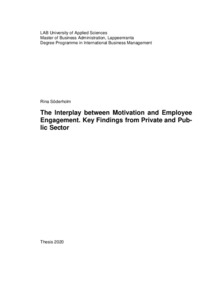The interplay between motivation and employee engagement : key findings from private and public sector
Söderholm, Rina (2020)
Söderholm, Rina
2020
All rights reserved. This publication is copyrighted. You may download, display and print it for Your own personal use. Commercial use is prohibited.
Julkaisun pysyvä osoite on
https://urn.fi/URN:NBN:fi:amk-2020052613621
https://urn.fi/URN:NBN:fi:amk-2020052613621
Tiivistelmä
Work motivation has an impact on quality of work, efficiency, and wellbeing of the employee and the workplace. Also, engaged employees are acknowledged to reach better results. The aim of the master’s thesis is to show an interplay between work motivation and employee engagement, moreover, highlight key findings from public and private sector.
The thesis includes two main parts: the theoretical and the empirical part. The theoretical part introduces work motivation concentrating on recent theories of drive by Pink and results-only work environment by Ressler and Thompson. The employee engagement part cover theories, literature and previous research results. The empirical part is conducted based on the theoretical findings to understand the interplay of work of employee engagement, as well as research the differences between public and private sector. Data for the research was collected using the qualitative interview method. Interviewees represented equally private and public sector.
The results of the study show clearly an interplay between motivation and employee engagement, which employee engagement can be described as an outcome of motivation. The interplay between these two is complicated as different factors motivate individuals, also engagement is experienced differently. The research identified that in the public sector one of the main motivational factors was the client, which is considered to be crucial to private sector. However, the respondents of the private sector did not mention clients as a motivational or engaging factor.
Based on the findings the important factors of employee motivation and engagement reveal similarities both in the public and private sector. Motivating and engaging work environment highlights the importance of colleagues, learning and development opportunities, possibility to work self-managed, as well as fair and knowledgeable management. The results of the research support the findings of the literature part. The respondents are motivated and engaged at their current workplace. However, it is important to provide learning and development opportunities to retain the talent in the long term.
The thesis includes two main parts: the theoretical and the empirical part. The theoretical part introduces work motivation concentrating on recent theories of drive by Pink and results-only work environment by Ressler and Thompson. The employee engagement part cover theories, literature and previous research results. The empirical part is conducted based on the theoretical findings to understand the interplay of work of employee engagement, as well as research the differences between public and private sector. Data for the research was collected using the qualitative interview method. Interviewees represented equally private and public sector.
The results of the study show clearly an interplay between motivation and employee engagement, which employee engagement can be described as an outcome of motivation. The interplay between these two is complicated as different factors motivate individuals, also engagement is experienced differently. The research identified that in the public sector one of the main motivational factors was the client, which is considered to be crucial to private sector. However, the respondents of the private sector did not mention clients as a motivational or engaging factor.
Based on the findings the important factors of employee motivation and engagement reveal similarities both in the public and private sector. Motivating and engaging work environment highlights the importance of colleagues, learning and development opportunities, possibility to work self-managed, as well as fair and knowledgeable management. The results of the research support the findings of the literature part. The respondents are motivated and engaged at their current workplace. However, it is important to provide learning and development opportunities to retain the talent in the long term.
